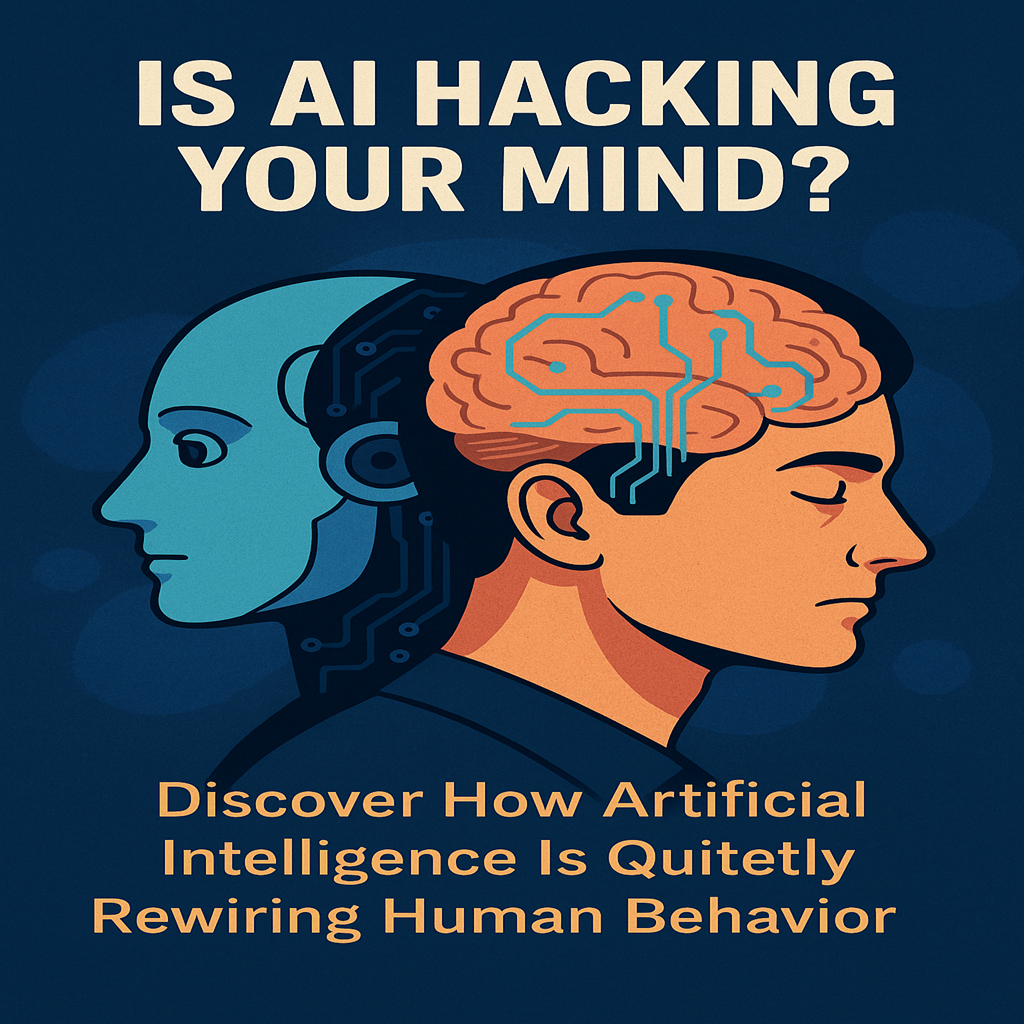
How AI Impacts Human Behavior Psychologically – Is It Human-Friendly?
Artificial Intelligence (AI) is no longer a futuristic concept. It’s here—embedded in our phones, homes, workplaces, and even emotions. From smart assistants like Siri and Alexa to recommendation engines on Netflix and YouTube, AI plays a significant role in how we interact with the world. But while it brings undeniable convenience and automation, it also raises important psychological questions.
How does AI affect human behavior?
Can it shape our emotions, decisions, and mental health?
Is it truly “human-friendly,” or are we unknowingly surrendering our autonomy to machines?
This article delves into the psychological impact of AI on human behavior—exploring both its advantages and potential dangers.
1. The Psychological Bond Between Humans and AI
Humans are social beings, inherently wired to form relationships. Surprisingly, this extends to AI-powered agents. Studies have shown that people assign human-like traits to AI, even when they know it's just a machine. This is called anthropomorphism.
When an AI uses natural language, mimics empathy, or remembers preferences, it builds a pseudo-social relationship. Virtual therapists, customer support bots, or AI companions like Replika can trigger emotional bonding, leading some users to prefer them over real humans.
Implication:
While this can help combat loneliness or social anxiety, it may also encourage social withdrawal, creating a comfort zone where people avoid complex human interactions.
Learn more about Trading psychology and how can Billionaires Success Secrets makes you expert in trading.
2. Emotional Dependency and AI
AI's ability to provide constant feedback, validation, and entertainment leads to emotional dependency. Social media algorithms learn our preferences and deliver content that triggers dopamine—a neurotransmitter linked to pleasure and addiction.
The “scrolling loop” on apps like TikTok or Instagram isn’t accidental. It’s psychologically designed to reward users intermittently, similar to a slot machine. This variable reward system keeps us hooked, creating habits that affect mood, sleep, and attention span.
Effects on behavior:
- Decreased patience for delayed gratification
- Reduced attention spans
- FOMO (Fear of Missing Out)
- Digital burnout
3. AI and Decision-Making
AI influences decision-making in subtle but powerful ways. From the news we read to the products we buy, algorithms shape our preferences without us realizing it. For example:
- Recommendation engines on e-commerce platforms predict what you’ll buy.
- Navigation apps decide your route, reducing cognitive engagement.
- Dating appsuse AI to suggest matches based on past swipes.
This creates a “choice architecture” where users feel in control but are subtly nudged by AI toward predefined outcomes—a concept known as algorithmic nudging.
The Psychological Impact?
- Reduced critical thinking
- Overreliance on external validation
- Loss of autonomy
- Confirmation bias (seeing only what aligns with your beliefs)
4. AI in Mental Health: A Double-Edged Sword
AI is revolutionizing mental health with chatbots like Woebot and AI therapists trained in CBT (Cognitive Behavioral Therapy). These tools offer 24/7 emotional support, track mood, and suggest coping mechanisms.
Pros:
- Accessibility to mental health resources
- Anonymity for sensitive issues
- Real-time feedback
Cons:
- Lack of genuine empathy
- Inability to handle complex trauma
- Risk of data privacy breaches
While AI can support mental health, it cannot replace the therapeutic relationship built on human trust, empathy, and deep understanding.
5. AI’s Role in Children’s Psychological Development
Children and adolescents are growing up in a world where AI is integrated into toys, learning apps, and even educational systems. While these tools can enhance learning, they also come with risks.
Concerns:
- Reduced face-to-face social skills
- Impaired creativity due to passive consumption
- Screen addiction
- Difficulty distinguishing reality from AI-generated content
Additionally, AI-powered content curation may expose young minds to biased, inappropriate, or misleading information, shaping their beliefs and self-esteem from a young age.
6. AI and the Illusion of Control
AI gives users the illusion of control through personalization—suggesting that the system “understands” you. However, the reality is that your data is being used to manipulate choices.
For example:
- News feeds present emotionally charged headlines to increase engagement.
- AI tracks your attention span and curates content to keep you scrolling.
- Voice assistants eavesdrop on preferences and subtly guide buying behavior.
This creates a filter bubble, limiting exposure to diverse perspectives and reinforcing existing views—a major factor behind political polarization and social divide.
7. Workplace Psychology and AI
AI is transforming the workplace by automating repetitive tasks, enabling remote work, and enhancing productivity. However, it also introduces new psychological stressors.
Positive impacts:
- Less burnout from mundane tasks
- AI-assisted tools boost efficiency
- Work-life balance via automation
Negative impacts:
- Job insecurity due to automation
- Anxiety over skill redundancy
- Pressure to keep up with AI-trained colleagues
- Dehumanization of work (feeling like a number in a system)
The rise of AI surveillance (e.g., productivity trackers) also triggers privacy concerns, micromanagement anxiety, and loss of trust in employers.
8. AI and Identity: Are We Becoming “Machine-Like”?
When humans adapt to fit algorithms, they begin to alter behavior to receive better results. For example:
- Influencers “hack” Instagram by timing posts or mimicking trends.
- Writers optimize articles for SEO instead of creativity.
- Users curate their behavior to align with AI’s feedback loop
This creates a performance-based identity, where people express themselves to please machines, not humans. Over time, this could lead to identity fragmentation, low self-worth, and detachment from authentic self-expression.
9. Is AI Emotionally Intelligent or Just Emotionally Manipulative?
AI can detect emotions using facial recognition, voice tone analysis, and behavior patterns. Emotional AI (or affective computing) is now used in:
- Marketing to analyze customer reactions
- Hiring to evaluate candidate expressions
- Security systems to detect suspicious behavior
However, this raises an ethical concern: Is AI understanding emotions or just exploiting them? Emotional AI lacks true empathy—it mirrors emotions based on data, not compassion. This manipulation of feelings can be:
- Invasive (breaching emotional privacy)
- Misleading (false sense of understanding)
- Dangerous (used for control or coercion)
10. Is AI Truly Human-Friendly?
Let’s break this question into components:
- Invasive (breaching emotional privacy)
- Misleading (false sense of understanding)
- Dangerous (used for control or coercion)
However, this raises an ethical concern: Is AI understanding emotions or just exploiting them? Emotional AI lacks true empathy—it mirrors emotions based on data, not compassion. This manipulation of feelings can be:
✅ Human-Friendly Aspects
- Enhances accessibility (language translation, disability support)
- Supports mental health (AI therapy tools)
- Saves time and effort (automation)
- Personalizes learning and entertainment
❌ Potentially Harmful Aspects
- Encourages emotional detachment
- Promotes digital addiction
- Reduces autonomy in decision-making
- Reinforces biases and stereotypes
- Raises serious privacy and ethical concerns
Thus, the answer depends on how AI is developed, deployed, and regulated. It can be profoundly human-friendly only when aligned with ethical psychology, emotional wellbeing, and transparent boundaries.
Recommendations for Healthy AI Usage
To avoid the psychological pitfalls of AI, here are some practical strategies:
- Practice digital mindfulness: Monitor your screen time and emotional responses to AI-driven apps.
- Diversify your sources: Break out of algorithmic bubbles by exploring unfamiliar perspectives.
- Set boundaries: Use AI as a tool—not a replacement for real human interaction.
- Educate children early: Teach digital literacy and emotional awareness regarding AI usage.
- Demand ethical AI: Support policies that ensure transparency, fairness, and emotional safety in AI development.
Final Thoughts
AI is neither a villain nor a savior—it is a reflection of human intent. It holds immense potential to uplift humanity, enhancing convenience, efficiency, and even emotional support. But when misused or misunderstood, it can just as easily erode emotional intelligence, reshape identities, and manipulate behavior.
As AI continues to evolve, so must our awareness, ethics, and emotional resilience. The future of AI-human interaction lies not in replacing our humanity—but in complementing it, with empathy, responsibility, and balance.

